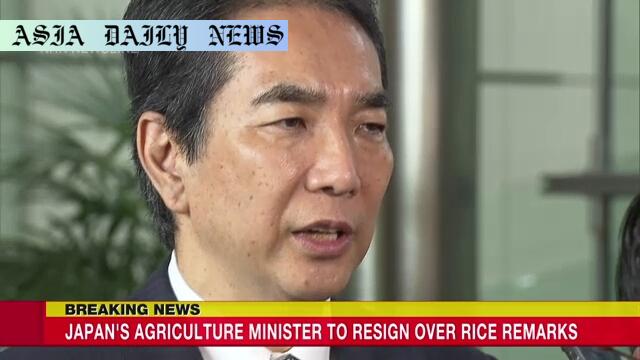Resignation: Japan’s agriculture minister submits resignation to PM Ishiba Shigeru over controversial rice remarks.
Eto Taku, Japan’s agriculture minister, resigns after controversial rice remarks.
He acknowledged not buying rice despite soaring prices in Japan.
Prime Minister Ishiba Shigeru accepted the resignation promptly.

Introduction to the Resignation
The abrupt resignation of Japan’s Agriculture Minister, Eto Taku, has sent ripples across the political and agricultural landscapes of Japan. Facing considerable backlash over his controversial remarks about never purchasing rice amidst soaring staple grain prices, Eto submitted his resignation to Prime Minister Ishiba Shigeru. This incident has underscored the critical importance of leaders’ connection with the realities faced by ordinary citizens as Japan grapples with food security and economic challenges.
Context of the Controversial Remarks
Eto Taku sparked public outrage when he stated during a press interaction that he had never purchased rice, a basic food staple in Japan, despite its high prices. His remarks were widely perceived as tone-deaf, given the economic hardships many Japanese citizens face, especially those affected by rising inflation and agricultural crises. His statement raised questions about his credibility as a leader responsible for the agricultural sector while seeming detached from the realities impacting the average citizen.
Government and Public Response
The backlash was swift and widespread. Citizen and political analysis painted Eto’s remarks as reflective of a widening gap between policymakers and the public they serve. Prime Minister Ishiba did not delay in accepting his resignation, signaling the administration’s prioritization of public trust over political loyalty. Simultaneously, opposition parties have used the incident as a point of criticism, urging greater accountability among the nation’s lawmakers.
Impact on Japan’s Agricultural Policies
The resignation comes at a critical time for Japan’s agriculture sector, which is already under pressure due to global food supply chain disruptions, climate change, and local challenges such as decreasing farmland availability and an aging farming population. As the country works toward self-sufficiency and stable food prices, this controversy has reignited discussions on transparency, leadership accountability, and proactive policymaking.
Looking Ahead
While Eto’s resignation marks the end of his political role in this capacity, it serves as a reminder of the importance of leaders being harmonious with the struggles of the population they serve. Key experts believe that this incident may act as a catalyst for more inclusive policymaking, focusing on transparent communication and empathetic leadership in governance structures moving forward.
Commentary
The Role of Empathy in Leadership
Eto Taku’s resignation following his controversial statement about rice buying offers a powerful lesson about the necessity of empathy in leadership. Leaders occupy a privileged space where their words, actions, and even public perceptions carry tremendous weight. In this case, Eto’s remarks illuminated a disconnect that citizens often feel when leaders appear out of touch with their struggles, especially amid economic and agricultural challenges.
Rebuilding Public Confidence
Japan’s political landscape has been marked by moments of trust-building and betrayal, like in many democratic structures. The swiftness with which Prime Minister Ishiba Shigeru reacted by accepting Eto’s resignation can be seen as a step toward maintaining public faith. It communicates to citizens that accountability still holds value and that leadership must reflect their hardships—and their hope for solutions.
Lessons for Policymakers
This incident serves as a valuable lesson not only for Japan’s leadership but for policymakers globally. It highlights the growing need for leaders to stay attuned to the realities of their societies. As global economies grow increasingly interconnected and challenges become more complex, leaders must balance policy expertise with human-centric communication if they are to maintain the confidence of those they govern.


